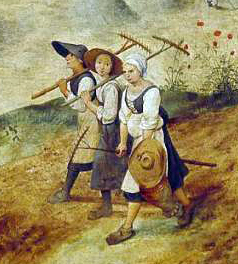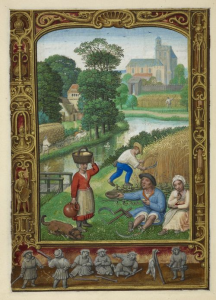For once the English summer hasn’t let us down and until the last few days we’ve enjoyed weeks of fine, warm weather. August is harvest-time. In The Tempest, Shakespeare writes of the “sunburnt sickle men, of August weary”, and tell them to “Make holiday! Your rye-straw hats put on”.
Francis Bacon, in Of Gardens, writes “In August come plums of all sorts in fruit, pears, apricots, barberries, filberts, musk-melons, monkhoods of all colours”, and Nicholas Breton, in Fantasticks, written about 1600, defines the month:
It is now August, and the sun is somewhat towards his declination, yet such is his heat as hardeneth the soft clay, dries up the standing ponds, withereth the sappy leaves and scorches the skin of the naked: now begin the gleaners to follow the corn cart, and a little bread to a great deal of drink makes the travailers dinner: the Melon and the cucumber is now in request: and the oil and vinegar give attendance to the sallet herbs: the Alehouse is more frequented than the Tavern, and a fresh river is more comfortable than a fiery furnace…and in the fair rivers, swimming is a sweet exercise…the Furmenty pot welcomes home the Harvest cart, and the Garland of flowers crowns the Captain of the Reapers… In sum, for that I find, I thus conclude, I hold it the world’s welfare, and the earth’s Warming pan. Farewell.
Bacon and Breton both clearly enjoy eating the produce that ripens at this time of year: Breton’s salad sound very much like our own, and I like the way he likens this time a year to a warming pan – it’s a lovely image.
But to get close to the life and experience of the working Tudor, you can’t beat Thomas Tusser’s Five Hundred Points of Good Husbandrie, written in sometimes painful verse.
Under “Good harvest points” he suggests:
Reape well, scatter not, gather cleane that is shone,
binde fast, shock apace, have an eie to thy corne.
Lode safe, carrie home, follow time being faire,
gove just in the barne, it is out of despaire.
He offers advice about timing your harvest:
If weather be faire, and tidie thy graine,
make speedily carrege, for feare of a raine:
For tempest and showers deceiveth a menie,
and lingering lubbers loose many a penie.
Harvest is also a time for remembering the poor, who traditionally are allowed to glean or pick up grains that have been dropped in the field:
Corne carried, let such as be poore go and gleane,
and after, thy cattle to mowth it up cleane.
Then spare it for rowen, till Mihel be past,
to lengthen thy dairie no better thou hast.
And harvest is a time to be generous to all:
Once ended thy harvest, let none be begilde,
please such as did help thee, man, woman, and child.
Thus dooing, with always such help as they can,
thou winnest the praise of the labouring man.
Tusser’s book was published in 1573, and Geoffrey Grigson, in his introduction to the Oxford University Press edition sums up its charm: “We can, if pre-industrial country life interests us, savour the pure enjoyment of seeing how farms looked in these Tudor years, how farming and farmers’ wives proceeded. Here is the farmer sitting to his food, according to season…Allow our eyes a little extra vision and Tusser takes us to ploughing and fallowing, to weeding the growing crops in May and June, ridding them as much as the farmer can from poppies and corncockle and boddles (corn marigolds), from titchis (vetches), [and] bracken.
Iris’s speech in The Tempest comes to mind:
Ceres, most bounteous lady, thy rich leas
Of wheat, rye, barley, vetches, oats and pease;
And Lear, when mad, is found in fields full of ripening corn:
Why, he was met even now
As mad as the vex’d sea, singing aloud,
Crown’d with rank fumiter and furrow weeds,
With harlocks, hemlock, nettles, cuckoo flow’rs,
Darnel, and all the idle weeds that grow
In our sustaining corn. A century send forth.
Search every acre in the high-grown field
And bring him to our eye.
It’s harder for us to connect with these speeches than it would have been in Shakespeare’s day, but we’re helped by Tusser and the other writers describing the life and concerns of country folk.
NB Click here to go to the reference for the image of the Book of Hours above



